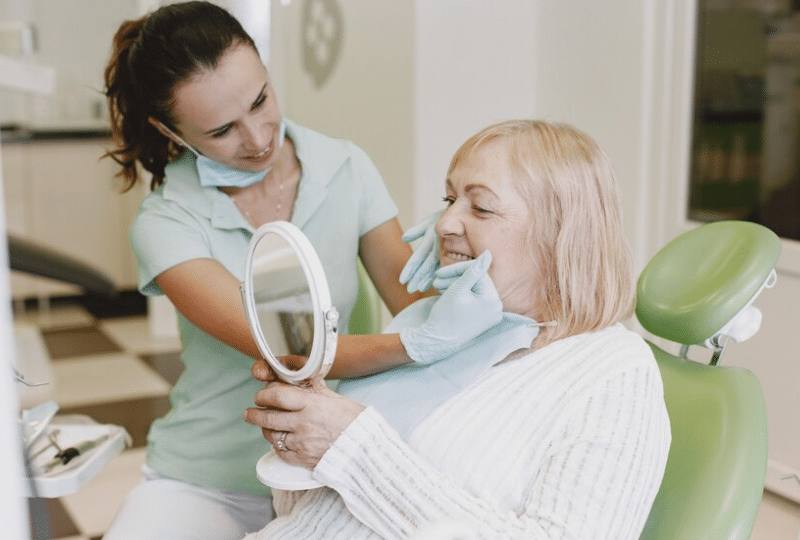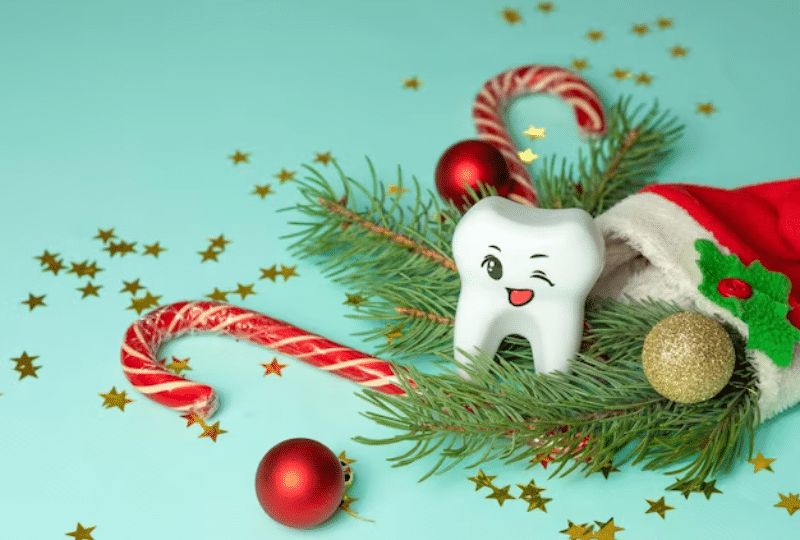
Are you tired of the same old oral health advice? Brush twice a day, floss daily, and visit your dentist regularly. While these tips are essential for maintaining healthy teeth and gums, there’s more to oral care than meets the eye. In this blog post, we’re going to share ten surprising tips that can help improve your oral health in ways you never imagined! From chewing gum to drinking milk before bed, get ready to learn some unconventional techniques that will revolutionize your dental routine. So let’s dive in and discover how simple changes can make a dramatic difference in your smile!
We all know that we should brush and floss our teeth daily, but there are a few other surprising things you can do to maintain good oral health. Here are four tips for keeping your smile healthy and bright:
1) Visit your dentist regularly – most people should visit their dentist every six months for a professional cleaning and check-up. However, if you have any specific concerns, don’t hesitate to schedule an appointment sooner.
2) Quit smoking – tobacco use is one of the leading causes of gum disease. If you smoke, quitting is one of the best things you can do for your oral health.
3) Eat a balanced diet – a diet rich in fruits, vegetables, and whole grains helps keep your teeth and gums healthy. Avoid sugary snacks and drinks, which can increase the risk of tooth decay.
4) Practice good oral hygiene habits – in addition to brushing and flossing daily, gargle with mouthwash and use interdental cleaners (like dental floss picks or water flossers) to clean between your teeth.
Brush Twice a Day
It’s no secret that brushing your teeth is important for oral health, but did you know that how you brush your teeth is just as important as how often you brush them? Here are some surprising tips for better oral health:
1. Brush Twice a Day
Brushing twice a day is the minimum recommendation from dental professionals for keeping your teeth and gums healthy. But if you really want to up your oral hygiene game, brush after every meal. That way, you’ll remove any food particles or bacteria that may have been left behind after eating.
2. Use the Right Toothbrush
When it comes to toothbrushes, size matters. Choose a toothbrush with soft bristles that fit comfortably in your mouth and reach all of your teeth without irritating your gums. And be sure to replace your toothbrush every three months or sooner if the bristles start to fray.
3. Be Gentle
You might think that scrubbing harder will get your teeth cleaner, but it can actually damage your enamel and irritate your gums. Instead, use gentle circular motions when brushing and avoid putting too much pressure on your teeth and gums.
Floss Daily
It’s no secret that brushing your teeth is important for maintaining good oral health. But did you know that flossing is just as important, if not more so? Here are a few reasons why you should make flossing a part of your daily routine:
Flossing removes plaque from between your teeth and along the gumline that brushing alone can’t reach. Plaque is a sticky film of bacteria that forms on your teeth and gums, and if it’s not removed, it can harden into tartar. Tartar can lead to gum disease, which can cause tooth loss.
Flossing helps prevent cavities by removing food particles and bacteria from between your teeth. When these particles are left behind, they can contribute to the formation of cavities.
Flossing stimulates blood flow to the gums and helps keep them healthy. Healthy gums are important for maintaining a strong foundation for your teeth.
So there you have it! A few simple reasons why flossing should be a part of your daily oral care routine. And don’t forget, regular dental check-ups are also key to keeping your smile healthy and bright!
Use an Antibacterial Mouthwash
1. Use an antibacterial mouthwash:
Mouthwash can be a great way to help keep your mouth clean and healthy. Look for an antibacterial mouthwash that contains fluoride. Fluoride can help to prevent tooth decay and cavities.
Drink Plenty of Water
Water is essential for good oral health. It helps rinse away food and bacteria, and it also prevents dry mouth, which can lead to cavities. aim to drink six to eight glasses of water a day, and always drink water after meals.
Avoid Sugary Drinks and Foods
There are many sugary drinks and foods out there that can wreak havoc on your oral health. It’s important to avoid these as much as possible in order to keep your teeth and gums healthy. Some of the worst offenders when it comes to sugar are sodas, energy drinks, fruit juices, candy, cookies, and cake.
Sugary drinks and foods can cause cavities by promoting the growth of bacteria in your mouth. These bacteria feed on the sugar and produce acids that attack your tooth enamel. Over time, this can lead to cavities. Cavities are holes in your teeth that can become infected and cause pain. They can also lead to more serious problems if left untreated.
To avoid cavities, it’s best to limit sugary drinks and foods as much as possible. When you do consume them, be sure to brush your teeth afterward. This will help remove the sugars and acids from your teeth before they have a chance to do any damage.

Watch Your Diet for Nutrients That Support Oral Health
A well-balanced diet is good for your overall health and includes your oral health. Eating a variety of nutrient-rich foods helps to keep your teeth and gums healthy. Here are some nutrients that are important for oral health:
Calcium: Calcium is essential for strong teeth and bones. Good sources of calcium include dairy products, leafy green vegetables, and calcium-fortified foods such as soy milk and orange juice.
Vitamin D: Vitamin D helps the body absorb calcium. Good sources of vitamin D include fatty fish, fortified milk, and vitamin D supplements.
Phosphorus: Phosphorus is another mineral that helps to keep teeth and bones strong. Good sources of phosphorus include meat, poultry, fish, eggs, and dairy products.
Water: Drinking plenty of water is important for keeping your mouth hydrated and free of bacteria.
Stop Smoking or Chewing Tobacco
If you want to improve your oral health, one of the best things you can do is stop smoking or chewing tobacco. Tobacco use is a leading cause of gum disease, which can lead to tooth loss. It also increases your risk of developing oral cancer. Quitting tobacco can be difficult, but there are many resources available to help you quit for good.
Visit the Dentist Regularly for Checkups and Cleanings
It’s important to visit the dentist regularly for checkups and cleanings. Some people may think that they only need to see the dentist if they have a problem, but it’s best to go for regular checkups. This way, the dentist can catch any problems early and prevent them from getting worse. Additionally, getting your teeth cleaned by a professional can help remove any plaque or tartar that has built up over time.
Wear a Nightguard to Prevent Grinding and Clenching Teeth
If you’re one of the many people who suffer from teeth grinding or clenching at night, you may want to consider wearing a nightguard. Nightguards are designed to protect your teeth from the damage that can be caused by grinding and clenching, and they can also help to prevent pain in the jaw and other facial muscles.
There are a few different types of nightguards available, and your dentist can help you choose the one that’s right for you. In general, though, it’s important to choose a nightguard that fits snugly over your teeth so that it doesn’t slip during the night. You also want to make sure that the guard is comfortable to wear so that you don’t mind wearing it every night.
If you’re not sure whether or not a nightguard is right for you, talk to your dentist about your options. He or she can help you weigh the pros and cons of wearing a guard and can also give you tips on how to use it properly.
1. Brush your teeth twice a day
It’s important to brush your teeth at least twice a day to remove plaque, bacteria, and food particles from your teeth and gums. Plaque is a sticky film of bacteria that can cause cavities, gum disease, and bad breath. Brushing your teeth removes plaque and helps prevent these problems.
2. Floss daily
Flossing removes plaque and bacteria from between your teeth, which brushing alone can’t reach. This helps prevent cavities and gum disease. Be sure to floss gently so you don’t damage your gums.
3. Use mouthwash
Mouthwash can help remove plaque and bacteria from your mouth, as well as freshen your breath. Look for a mouthwash that contains fluoride to help prevent cavities. Swish the mouthwash around in your mouth for 30 seconds before spitting it out.
The American Dental Association (ADA) recommends brushing your teeth twice a day with fluoride toothpaste.
The ADA recommends brushing your teeth for two minutes, at least.



